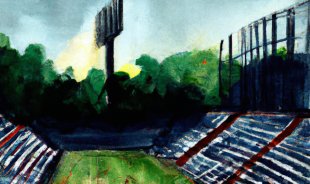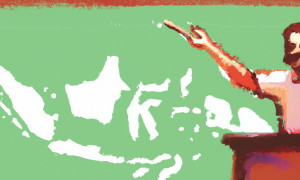On 16 March 2023, a panel of judges decided the outcome of the trial of the five defendants in the Kanjuruhan tear gas case. They were sentenced lightly: two were sentenced to 1 year and 6 months in prison, one was sentenced to a year, and two were acquitted. Many Indonesians believed that from the beginning, the legal process did not really uncover the extent of wrongdoing in the Kanjuruhan case, and that the legal process was intended to fail on revealing the truth and protecting the perpetrators of crimes in the tragedy. This outcome is considered part of a defective trial process.
A person or group who becomes a victim of a criminal offence experiences a double burden when the system cannot deliver restitution. In addition to being materially harmed, they also experience further victimisation due to systematic rejection by the criminal justice system. This rejection occurs because there is a view that the victim’s position has been taken over by the state, and this makes the victim’s efforts in fighting for their rights limited. The victim as the one who suffers as a result of a violation of criminal law is limited to providing testimony as a victim and/or witness.
As a result, victims often feel dissatisfied with the charges filed by the Public Prosecutor (known in Indonesia as Jaksa Pidana Umum or JPU) or the judge’s decision because it is considered not in accordance with victims’ values of justice. This occurs as a result of the criminal court system being used to prosecute perpetrators of criminal acts—which are classified as acts against the state—rather than to serve the interests of victims of those criminal acts. The nature of this system means that victims of criminal offences must bear the consequences of legal crimes independently, without intervention from the state.
Restitution
The importance of restitution to provide protection to victims has been stated in Articles 8-11 and 12–13 of the United Nations’ 1985 Declaration of Basic Principles of Justice for Victims of Crime and Abuse of Power. Several articles in this declaration state that the perpetrator of the crime or other responsible parties must provide restitution to the victim or their family, including compensation for damaged or lost property, compensation for the recovery of suffering, and other victim rights.
If restitution is not fulfilled by the perpetrator or other stakeholders, then the state should take over in providing compensation to the victim. There are important points in the 1985 declaration regarding the provision of restitution, where the government as the competent authority should review practices, policies and laws to consider restitution as a legal option available in criminal cases, in addition to other criminal sanctions. Inclusion of restitution as an additional punishment can make it easier for judges to pay more attention to the plight of victims.
This movement in turn has resulted in greater awareness of the needs of victims in the criminal justice system. Victims of crime are often ignored in the criminal justice system, even though they should be provided with support, information and assistance by the courts. In this context, restitution is a small part of the effort to fulfil victims’ rights. Through restitution, criminals are held accountable for the losses suffered by the victims of their crimes.
Victim and witness protection regulation
In Indonesia’s 2014 Law on Victim and Witness Protection, restitution is defined as compensation provided to victims or their families by the perpetrator or a third party (Article 1 Section 11), while compensation is defined as a substitute for losses provided by the state because the perpetrator is unable to provide full compensation for which he is responsible to the victim or his family (Article 1 Section 10)..
According to Article 7a Section 1 of the 2014 law, victims of criminal offences are entitled to restitution in the form of: compensation for loss of wealth or income; compensation for losses incurred due to suffering directly related to the criminal offense; and/or reimbursement of medical and/or psychological treatment costs. For victims of serious human rights violations and victims of terrorism, in addition to being entitled to restitution, they are also entitled to compensation that can be submitted through the Witness and Victim Protection Agency (LPSK). Based on the articles above, restitution applications can be submitted through LPSK both before or after a court decision that has obtained permanent legal force.
In the context of restitution, the provision of restitution to victims of criminal acts is contained in Articles 98 to 101 of the 2014 law, which regulate the possibility of merging compensation cases. Article 98 states that if an act that forms the basis of an indictment in a criminal case heard by a district court causes harm to another person, the presiding judge may decide to merge the compensation claim case with the criminal case. Such a request can only be made at the latest before the public prosecutor files criminal charges. In the absence of the public prosecutor, the request shall be made no later than before the judge pronounces a verdict.
The merger of compensation cases as stipulated in Indonesia’s Criminal Procedure Code is in accordance with the principle of balance, which is not only concerned with the rights of the perpetrator, but also the protection of the rights of the victim as another related party. One of the objectives of this merger is the achievement of the principle of simple, fast and low-cost justice.
Although it reflects the protection of victims, the provision for the merger of cases outlined above has weaknesses. These weaknesses include: that it depends on a single main criminal case; that compensation is only for material losses; that the submission is no later than before the prosecution; that the legal remedy depends on the main case; and that if the criminal case is not appealed, the compensation claim cannot also be appealed. With these weaknesses, the incorporation of compensation cases into criminal prosecutions that Indonesia’s Law on Victim and Witness Protection is not fully oriented towards the protection of victims—for example in cases at the district court level where a defendant is sentenced to punishment, but their victims’ compensation claim is not granted.
If the victim seeks full compensation, then they must continue to go through the civil process because the incorporation of their compensation claim in the criminal case is only limited to the amount of material losses they have suffered as a direct consequence of the criminal activity in question.
According to Fauzy Marasabessy, the provision in Article 7a that limits compensation claims to dealing with only material losses is actually a contradiction of the contents of Article 101 which reads “the provisions of the rules of civil procedure law apply to compensation claims”. Thus, there should be no need for restrictions on the type of loss—because under the provisions of Indonesian civil law, both material and immaterial damages can be the basis of compensation claims.
Restitution for Kanjuruhan Victims
Indonesia’s Witness and Victim Protection Agency (LPSK) conducted an assessment of the restitution to which victims of Kanjuruhan are entitled and submitted it to the court trying the five perpetrators of the Kanjuruhan for crimes of causing death or injury due to negligence. LPSK assessed that 42 kanjuruhan victims who applied to it for financial restitution were collectively entitled to financial damages of Rp8.85 billion (A$895,000).
LPSK sent a letter to the East Java Prosecutor’s Office about the restitution value on 22 February 2023. However, because the letter arrived late, the the restitution request was not cited in the prosecutor’s indictment.
According to information provided in an interview with LPSK with some the authors, the number of applicants for LPSK protection for the Kanjuruhan tragedy amounted to 65 out of 782 people, including 23 people protected as witnesses and 42 victims who applied for restitution. The percentage level of witnesses and victims protected by the state through LPSK is only 8% of the total estimated number of victims.
Number of Restitution Victims Requested by LPSK
| No. | Status | Kanjuruhan Casualties | Victims for whom restitution is requested |
| 1. | Death | 135 people | 35 people |
| 2. | Wounded | 647 people | 7 people |
| Total korban | 782 people | 42 people | |
Submission of restitution for children of Kanjuruhan victims
| No. | Child Status | Number of child victims | Victim’s child submitted for restitution |
| 1. | Death | 44 children | 7 children |
| 2. | Wounded | 201 children | 3 children |
| Total child casualties | 245 children | 10 children | |
Ineffective legal framework
Indonesia’s Supreme Court Regulation No. 1 of 2022, governing the procedures for resolving applications and providing restitution and compensation to victims of criminal acts, requires victims to actively demand restitution rights from the perpetrators of criminal acts through applications to LPSK. This procedure ultimately has a weakness: namely the absence of legal certainty for victims, which burdens victims mentally and materially.
Regulations related to the fulfillment of victims’ rights also do not distinguish between adult and child victims. In fact, as many as one third of the victims of the Kanjuruhan tragedy were children, totalling 245 victims, consisting of 44 children who died, 9 who were seriously injured and 192 who received minor injuries.
In the context of criminal law regulation towards victims of crime, two basic models of regulation are recognised, namely The procedural rights model and the services model. The first model is given to the possibility of the victim to play an active role in the judicial process, so that the victim is given the right to conduct criminal prosecution such as the right to be heard and presented at the trial, the right to be consulted by prison authorities before the offender is given conditional release, and the right to make peace, including assisting the public prosecutor in their work in the justice system.
In the service model, it is necessary to emphasize the creation of standard standards for the guidance of victims, for example in the context of notification to victims and/or prosecutors in the course of the case, providing compensation, and so on. In fact, during the trial of the Kanjuruhan case from 20 January– to 16 February 2023, the involvement and interest of the families of victims and victim witnesses was minimal. The court banned direct media coverage and electronic broadcasts and transferred the trial process to the Surabaya District Court instead of holding it in Malang.
Compensation can only be pursued through prosecution or appeal files or using a civil trial mechanism, namely a hearing on a request for restitution determination. An alternative solution that can be taken quickly is to submit an application to the Surabaya District Court through a restitution determination application hearing, with a format like a civil lawsuit. However, the East Java Prosecutor’s Office considers it impossible to impose restitution for only some of the defendants.
In the relevant 2022 Supreme Court Regulation that details how compensation claims can be mounted as part of criminal cases, the weakness also lies in the absence of coercive elements for ordinary criminal offence, as in the Kanjuruhan tragedy. The Attorney General, civil or military prosecutor may confiscate assets and impose substitute imprisonment to fulfill restitution payments limited to criminal offenses of human trafficking and terrorism (Article 30 Section 11). Meanwhile, in ordinary criminal offence, the A–G or prosecutor is limited to giving instructions to the perpetrators of criminal acts and/or third parties to carry out the provision of restitution no later than 14 days from the date the order is received (Article 30 Section 9). The East Java Attorney General’s Office did not provide alternative options when the restitution burden cannot be paid by the criminal offender. In other words, in Indonesian law, the form of restitution does not accommodate state assistance in fulfilling victims’ rights or state intervention in assisting criminal offenders to fulfill restitution. In the context of the Kanjuruhan tragedy, only 42 victims applied for restitution and there were 93 other victims plus other injured victims who did not take this option.
It is undeniable that the only thing the victims of the tragedy can do after the verdict of the five Kanjuruhan defendants is announced is to apply for restitution for the losses they endured through LPSK, as an institution that has the mandate and role to provide protection and other rights to witnesses and/or victims. But the existing legal framework has not concretely accommodated the full rights of victims of the Kanjuruhan Tragedy. This has resulted in disappointment from victims as a result of legal conditions that do not have a victim’s perspective in mind.
The state’s obligation to provide compensation is predicated on the failure of law enforcement to eliminate or prevent crime. Compensation is based on fairness and social solidarity, and begins from the reality that other sources of compensation have proven inadequate to fully compensate victims. In providing benefits to society at large, the application of compensation through compensation is more suitable where the state takes responsibility and empathises with its society because it is considered to have failed to protect and anticipate a criminal act can occur. The provision of restitution or compensation puts more emphasis on the restorative justice approach given to each individual victim of crime from the perpetrator who provides protection for each victim.
The anger of the supporters of those impacted by the Kanjuruhan disaster—expressed through the slogan “Usut Tuntas” (investigate thoroughly)—has become a basis of hope for efforts to seek justice for victims. Along the way, several groups of supporters and the community have carried out struggles by demanding that law enforcement officials prosecute suspects. This includes urging the state to find the true facts about the motive and reality of the incident. However, their demands currently seem to have reached a deadlock. There is no positive will from the government (including law enforcement officials) to reveal the true facts while providing justice for victims.
The collective awareness of a legal process that does not favour their interests has been strongly embedded in the minds of victims, even though the families of victims still demand justice in the process of legal settlement in court. Three demands were made in a 10 November 2022 declaration, namely: demanding to arrest and prosecute all actors behind the Kanjuruhan tragedy and all executors in the field; making the Kanjuruhan tragedy a human rights violation; demanding compensation for all losses suffered by victims and families of victims of the Kanjuruhan tragedy through compensation and restitution. Progress on all three still lies far from the values of justice for victims. Looking at the judicial process so far, solving cases from a victim’s perspective is still like looking for a needle in a haystack, difficult to achieve.
 Facebook
Facebook  Twitter
Twitter  Soundcloud
Soundcloud  Youtube
Youtube  Rss
Rss 



